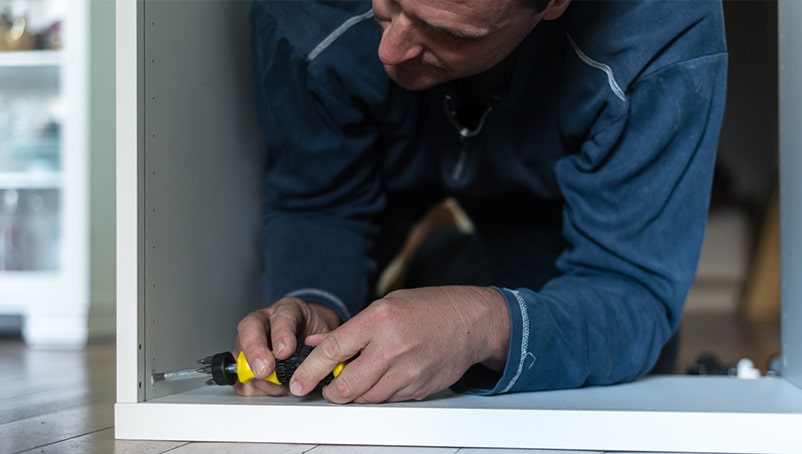Handyman license requirements by state: A comprehensive guide
Search for your state
A handyman is skilled at a wide range of general maintenance and home repair jobs. These are typically small or odd jobs that don’t require a permit.
Individual states generally do not issue specific handyman licenses. However, a handyman may be considered a contractor when a project exceeds a specific cost or is part of a larger job. In this case, a handyman may be required to have a contractor license to perform the work or be subject to handyman license requirements.
Make sure that if you plan to perform any plumbing, electrical or HVAC work that you check the licensing requirements as these are commonly not covered under the handyman or general contractor license requirements.
How to get a handyman license
Whether you’re just starting out as a handyman or you’ve been working on your craft for years, it’s important to know the licensing requirements of the state where you plan to do business.
Each state has its own handyman license requirements, and some cities issue licenses at the local level. These regulations can seem complex, which is why we’ve put together this state-by-state guide for you.
This comprehensive list of handyman license requirements is in alphabetical order so that the information you need is easy to find. If you click on the state name, you’ll be directed to the relevant government authority for licensing.
Once you know that you are in compliance with license requirements make sure you have the right handyman insurance so you are protected from the risks you face every day.
Apply for a handyman insurance quote and get a certificate of insurance in 10 minutes are less with Next Insurance.

Alabama
A handyman does not need a state license in Alabama. Contractors are only required to have a license if the cost of their project is valued at more than $50,000.
Alaska
A handyman in Alaska must hold a license to perform work worth up to $10,000. The General Contractor – Handyman license is issued by the Department of Commerce, Community and Economic Development, Division of Corporations Business and Professional Licensing.
You must show proof of general liability and property damage insurance.
Arizona
Contractors who perform work worth over $1,000 must have an Arizona contractors license. Work that is worth less than $1,000 and is of a casual or minor nature does not carry handyman license requirements. This is commonly known as the handyman exemption.
However, if the job has a value under $1,000 but still requires a building permit, the handyman exemption will not apply and a license will be required.
The Arizona contractors license is issued by the Registrar of Contractors. To be eligible for a license, you’ll need to pass a trade, business and law exam, and submit proof of a bond.
Arkansas
You’ll need a Home Improvement License as a handyman in Arkansas if you are planning to do specialty work worth more than $2,000 as a contractor at a single-family residence. This includes painting, roofing, flooring and other projects.
If you’re planning on doing more significant work you’ll need to consider another Arkansas contractors license for residential remodelers or residential rebuilders.
There is no exam, but the handyman license requirements include proof of workers’ compensation insurance, as well as a financial statement.
California
There is no specific handyman license in California. However, a handyman working on jobs worth more than $500 (even if your component is less than $500, but the overall job is worth more) must have a state license in California.
If you work on a job that does not become a fixed part of the structure, such as hanging pictures or building furniture, you’ll be exempt from the $500 limit and can work on bigger projects.
To cover all your options, you can get a California general contractor license from the Contractors State License Board. To be eligible for the license, you’ll need to show four years of work experience, have a certificate of insurance, and a contractor’s bond of $15,000. You’ll need to pass the trade, and business and law exam.
Colorado
As a handyman, you fall under the category of general contractors in Colorado. There are no state handyman license requirements for general contractors, although there are some local requirements that you need to check before you begin work.
Connecticut
Handymen do not need a state license to work in Connecticut. However, if you consider yourself a home improvement contractor who creates permanent changes to a residential property, you’ll need to register with the Department of Consumer Protection.
Delaware
There is no specific handyman license. General contractors in Delaware require a business license for revenue purposes and must register with the state to work on projects worth more than $50,000.
Florida
As a handyman in Florida, you don’t need a state license for miscellaneous non-structural work, such as minor carpentry, door repairs, panelling, tile installation and window repair.
However, any structural work, such as building, home renovations, and roofing work, will require a Florida general contractor license. The license is issued by the Department of Business and Professional Regulation and will require you to show four years of experience, as well as proof of general liability insurance and workers’ compensation insurance in Florida. You must pass an exam.
Georgia
A handyman who works on any projects worth more than $2,500 needs a Residential-Basic Contractor license to work in Georgia.
You will need to pass a trade exam and a business and law exam. You’ll need pre-approval from the Georgia Board of Residential and General Contractors in to write the exam. You must have two years of experience and must show proof of general liability insurance and workers’ compensation insurance in Georgia.
Hawaii
Hawaii requires all handymen who work on jobs where the labor and material are worth more than $1,000 or require a building permit, to hold a license.
General building contractor licenses and specialty contractor licenses are issued by the Department of Commerce and Consumer Affairs Professional and Vocational Licensing. You’ll need to pass a trade exam and a business and law exam, show four years of experience in the past 10 years, and show proof of insurance.
Idaho
There are no contractor licensing requirements in Idaho. A handyman, however, cannot claim to be a contractor without registering with the Idaho Contractors Board.
Illinois
Handymen and general contractors are not required to have a state license to work in Illinois. However, many local jurisdictions including Chicago, require that handymen and contractors have a general contractor license.
Indiana
There are no licensing requirements for handymen or general contractors in Indiana. However, there may be regulations at a local level. Check with your local regulatory agencies before you do any work.
Iowa
Iowa does not require a handyman to hold a state license. However, if you do business in the state and make more than $2,000 per year, you must register as a contractor with the Iowa Division of Labor.
Kansas
As a handyman, you won’t need to get a state license to work in Kansas. However, there are regulations for general contractors on a local level so make sure to check these before you begin work.
Kentucky
Kentucky does not require handymen or general contractors to hold a state license. However, be sure to check handyman license requirements with your local government before you begin work to make sure you are in compliance.
Louisiana
A handyman must hold a state license in Louisiana for home improvement projects or residential projects where the labor and materials cost more than $7,500.
The residential license is issued by the Louisiana State Licensing Board for Contractors. You may need to pass a trade exam and a business and law exam in the subspecialty you’re planning to work in, and you’ll need to show proof of insurance.
There is also home improvement registration required for projects valued between $7,500 and $75,000. Registration requires only proof of insurance.
Maine
There are no general contractor or handyman license requirements at the state level in Maine. There may be local regulations you need to comply with, so make sure to check these out before you begin working.
Maryland
A handyman working in Maryland will need a Home Improvement license from the Department of Labor, Licensing and Regulation.
According to the department website, this will cover additions or alterations, conversions, improvement, modernization, remodeling, repair or replacement of a residential building. You must show two years of experience in home improvement work and a certificate of insurance. You must also pass an exam that questions about business and law.
Massachusetts
A handyman who performs home improvement jobs and property repairs does not need a state license, but must have a home improvement contractor registration.
There is no exam requirement, but you must pay a registration fee. If you perform any structural work, such as a renovation or larger building projects to existing homes, you’ll need a Construction Supervisor License.
There are various licenses depending on the scope of the work you plan to perform, including “restricted” licenses for work on one-to-two-family homes and “unrestricted” licenses for work on structures up to 35,000 cubic feet. You’ll need to show three years of experience and pass an exam to be eligible for a license.
Michigan
A handyman in Michigan does not need a specific handyman’s license to work in the state. However, there are many jobs that a handyman may do that could require a license, including carpentry, laying concrete, painting and tiling. These all require a Maintenance and Alteration Contractor License. To be eligible for the license, you’ll need to complete 60 hours of educational courses and pass an exam.
Minnesota
If you’re a handyman in Minnesota and you make more than $15,000 per year by working on existing structures, you’ll need a Residential Remodeler License. Contractors who build new structures require a Residential Building License.
The license is issued by the Department of Labor and Industry. However, if you only provide services in one specialty skill area (excavation, masonry, carpentry, interior finishing, exterior finishing, drywall and plaster or general installation specialties), you do not need a license. To be eligible for a license, you’ll need to pass an exam and show proof of general liability and workers’ compensation insurance.
Mississippi
A handyman does not need a license in Mississippi unless the residential job costs more than $10,000. In this case, you’ll need a Residential Remodeling license issued by the Mississippi Contractor Licensing Board.
You’ll need to pass the residential trade exam and the business and law exam, and show proof of general liability and worker’s compensation insurance.
Missouri
Handymen and general contractors do not need a state license to work in Missouri. Check your local handyman license requirements to make sure you are in compliance with any city regulations.
Montana
General contractors, including handymen, are not required to hold a license to work in Montana. However, if you have employees, you will be required to register with the Department of Labor and Industry, Contractor Registration Unit.
To register, you must show proof of workers’ compensation insurance. If you have no employees, you can register, but you’re not required to. You cannot perform any electrical work without a license.
Nebraska
You can work as a handyman in Nebraska without a state license. However, you will need to register with the Nebraska Department of Labor. This requirement applies to all general contractors, subcontractors or people who perform construction, alterations, renovations, additions, installations or repairs.
Nevada
As a handyman, you will need a contractor license in Nevada if you plan to do any work worth more than $1,000 or work that requires a building license. The handyman exemption applies to work worth less than this amount. However, it limits the services you can offer. License is awarded by the Nevada Contractors Board.
To be eligible for a license, you’ll need to show four years of work experience as a journeyman, foreman, supervising employee or contractor. Up to three years of experience can be substituted for years of education at an approved college. You’ll need to pass a trade exam and a business and law exam and show proof of insurance.
New Hampshire
Handymen are not required to have a state license to work in New Hampshire, which only licenses those who perform electrical, plumbing or asbestos abatement work.
New Jersey
A handyman, known as a home improvement contractor, does not need to have a license to work in New Jersey, but is required to register with the New Jersey Division of Consumer Affairs.
New Mexico
General contractors in New Mexico are required to have a state license to work. As a handyman, you may fall under the classification of general contractor with a specific classification for the type of work you do. For example, you could be classified as a GB-2 Residential or GB-98 General Building contractor.
The residential classification requires two years of experience and the general building classification requires four years experience. You’ll also need to pass a trade exam and a business and law exam.
New York
There are no state licensing requirements for handymen or general contractors in New York. However, there are laws and regulations at a local level. Check handyman license requirements with local government before you do any work.
North Carolina
A handyman doesn’t need a state license in North Carolina, where licenses are only required if the projects being worked on are worth more than $30,000. If you are a subcontractor working under the supervision of a general contractor, you also don’t need a license.
North Dakota
A handyman must have a contractor license to perform any jobs in North Dakota that are worth more than $4,000. The contractor license covers any construction, alteration or repairs to a property. It is awarded by the Secretary of State of North Dakota. There are four classes of licenses based on the size of the jobs you plan to work on.
Ohio
You don’t need a handyman license at the state level to work in Ohio, but there may be regulations at the local level. Make sure to confirm with your local government before you start work.
Oklahoma
As a handyman, you will not need a state license to work in Oklahoma on any renovation, remodeling, repair or construction project. Make sure to check with local governments to see if there are any regulations on the local level before you begin work.
Oregon
A handyman must hold a state license in Oregon to work on jobs that are worth more than $1,000. Anyone doing construction work that involves improvements to a property must have a contractor license issued by the Oregon Construction Contractors Board. You’ll need to pass pre-license training and pass a test, and show proof of general liability and workers’ compensation insurance.
Pennsylvania
You do not need a state license to work as a handyman in Pennsylvania. However, if you do more than $5,000 worth of home improvement work per year, you must register with the Attorney General’s Office.
Rhode Island
As a handyman, you won’t need a license to work in Rhode Island. However, if you work on construction, alterations, remodeling or repair projects at residential properties, you’ll need to register with the State of Rhode Island Contractors’ Registration and Licensing Board.
South Carolina
A handyman, under the classification of Residential Specialty Contractor, does not need a license to work in South Carolina. However, you will need to register with the South Carolina Department of Labor, Licensing and Regulation. This allows you to work in carpentry, drywalling, wallpaper, painting, sidings, insulation, floor covering, masonry, concrete and roofing.
South Dakota
Handymen do not need a state license to work in South Dakota. There may be handyman license requirements at the local level so make sure to confirm with local agencies before you start work.
Tennessee
A handyman in Tennessee is not required to hold a state license unless the job they are working on is worth more than $25,000. A home improvement license is required for remodeling jobs worth between $3,000 and $24,999.
Licenses are awarded by the Department of Commerce and Insurance Board for Licensing Contractors. You’ll need to pass a trade exam and a business and law exam. You must also show proof of general liability and workers’ compensation insurance.

Texas
There are no state handyman license requirements for handymen in Texas. However, local regulations may require you to be licensed or registered to work as a handyman. For example, most major Texas cities have permit or licensing rules for general contractors and construction work.
Utah
Utah requires a license for contractors who perform work that is worth more than $3,000. Any projects that are worth less than that amount are commonly known as the handyman exemption.
If you do work that is worth less than $3,000, but more than $1,000, you’ll need to file an affirmation of exemption and show proof that you have general liability and worker’s compensation insurance.
If you perform work worth more than $3,000, you will require a contractor license issued by the Utah Division of Occupational and Professional Licensing. You’ll need to show two years of experience under a licensed contractor and pass an exam.
You must show proof of general liability and worker’s compensation insurance.
Vermont
You do not need a state license to work as a handyman in Vermont. However, there may be regulations at the local level that you need to check before you begin work.
Virginia
A handyman will need a Virginia contractors license to do work worth more than $1,000. There are three classes of licenses, depending on the monetary value of the projects you plan to work on.
You’ll need to complete a pre-license education course approved by the board. If you apply for a Class C license (single projects up to $10,000 and up to $150,000 per year), you must show two years of experience in the specialty you want to be licensed for.
Washington
There is no state license for handymen in Washington. However, all contractor and specialty contractors must register with the Washington State Department of Labor and Industries.
A handyman is considered a specialty contractor and is defined as someone who does minor work on existing properties worth a total value of less than $2,000. This does not include work that requires a building permit, and all work must be completed personally. To register, you’ll need to purchase a $6,000 bond and show proof of general liability insurance.
West Virginia
The state of West Virginia does not issue a specific handyman license or have handyman license requirements. However if you plan to do any work that is part of a project worth more than $2,500 but less than $10,000, you’ll need a contractors license from the WV Division of Labor. You will need to pass an exam and show proof of workers’ compensation insurance.
Wisconsin
To work as a handyman in Wisconsin you’ll need to hold a Wisconsin Dwelling Contractor Qualifier license, which is the contractor license that is issued to individuals. You’ll need to complete and pass a 12-hour course to be eligible for a license from the Department of Safety and Professional Services.
Wyoming
You do not need a state license to work as a handyman in Wyoming; however, there may be local regulations which you need to check before you begin work.
This information is provided as a service. To the best of our knowledge, it is correct and up-to-date; however, it is not to be taken as legal advice and you must always check with local authorities before making any business decisions. Requirements and regulations are subject to change at any time.
How Next Insurance helps handyman businesses
Next Insurance specializes in handyman insurance that can be customized to meet your specific business needs. Our coverage includes liability insurance, business car insurance, and workers’ compensation insurance to cover medical expenses and lost wages if you are injured on the job.
Start a free online application to review options for your business. You can get a quote, purchase coverage and have a certificate of insurance in about 10 minutes with our online services.
Get an instant quote with Next Insurance today.

